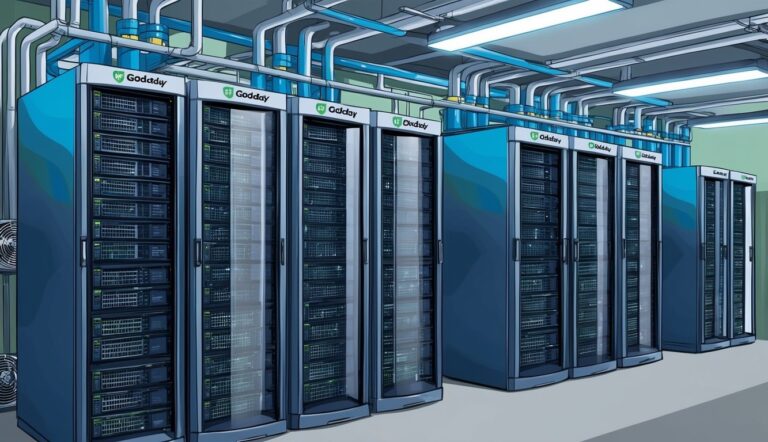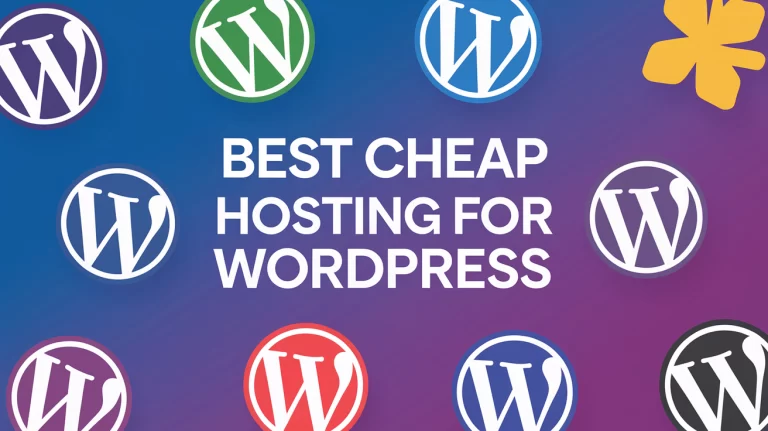Best Hosting for High Traffic Websites: Top Choices for Smooth Performance

Hey there, tech enthusiasts! Today I’m diving into a topic that’s crucial for anyone running a popular website – finding the best hosting for high-traffic sites. We all know the frustration of a slow-loading page, and trust me, your visitors feel it too.

Choosing the right web host can make or break your site’s performance when traffic spikes. I’ve spent countless hours testing different hosting providers, and I’m excited to share my findings with you. Whether you’re running a bustling e-commerce store or a viral blog, I’ve got you covered with some top-notch hosting options that can handle the heat.
1) SiteGround
I’ve gotta tell you, SiteGround is a powerhouse when it comes to hosting high-traffic websites. These guys know their stuff! They offer web hosting crafted for top performance and speed, which is exactly what you need when you’re dealing with a ton of visitors.
One thing I love about SiteGround is their customer support. It’s seriously impressive! They managed to achieve a 97.7% customer satisfaction rate in 2020, which is no small feat. Trust me, when your site’s under heavy load, you’ll be glad to have their experts in your corner.
SiteGround really shines when it comes to WordPress hosting. If you’re running a WordPress site with high traffic, these folks have got you covered. They’ve optimized their services specifically for WordPress, so you can expect smooth sailing.
Now, let’s talk speed. SiteGround doesn’t mess around when it comes to page loading times. They use cutting-edge technology to ensure your site stays snappy, even during traffic spikes. I’m talking SSD storage, custom server software, and the works!
Pros:
- Excellent customer support
- Optimized for WordPress
- Fast page loading speeds
- High uptime guarantee
Cons:
- Higher prices than some competitors
- Limited storage on lower-tier plans
Want to learn more? Check out this detailed SiteGround review for all the nitty-gritty details!
2) Bluehost
I’ve gotta say, Bluehost is a solid choice for high-traffic websites. They’ve been around for ages and really know their stuff when it comes to handling heavy loads.
One thing I love about Bluehost is their range of plans. They’ve got options for everyone, from small blogs to big e-commerce sites. Their dedicated hosting is particularly impressive for high-traffic sites.
Let’s talk speed. Bluehost doesn’t mess around when it comes to performance. They use SSD storage and offer free CDN, which means your site loads fast even when traffic spikes.
I’m also a fan of their uptime. In my experience, Bluehost keeps sites running smoothly, even during busy periods. That’s crucial for high-traffic sites where every second of downtime can cost you visitors.
Pros:
- Great performance for high-traffic sites
- Reliable uptime
- Variety of hosting plans
- Free CDN included
Cons:
- Can be pricier than some alternatives
- Advanced features may require higher-tier plans
Want to learn more? Check out Bluehost’s hosting options for yourself!
3) Kinsta
I’ve gotta tell you, Kinsta is a real powerhouse when it comes to hosting high-traffic WordPress sites. These folks know their stuff!
Kinsta’s managed WordPress hosting is built on Google Cloud Platform, which means it’s lightning-fast and super scalable. I’m talking about the kind of performance that’ll make your site visitors go “Whoa!”
One thing I love about Kinsta is their automatic scaling. Your site won’t break a sweat during traffic spikes. It’s like having a bouncer who lets everyone in without creating a line!
Their dashboard is slick and user-friendly. I could navigate it blindfolded (not that I’ve tried, mind you). Plus, their support team is top-notch. They’re like your personal WordPress superheroes, ready to swoop in 24/7.
Pros:
- Blazing fast performance
- Automatic scaling for traffic spikes
- User-friendly dashboard
- Excellent 24/7 support
Cons:
- Higher price point
- No email hosting
Want to learn more? Check out Kinsta’s features for all the juicy details!
4) InMotion Hosting
I’ve got to say, InMotion Hosting really impresses me when it comes to handling high-traffic websites. They offer a range of hosting solutions that can keep up with demanding traffic loads.
What caught my eye is their use of SSD-based servers. These speedy drives make a huge difference in website performance, especially when you’re dealing with lots of visitors.
I love that InMotion gives you options. You can choose from shared, VPS, dedicated, or even WordPress-specific hosting. This means you can pick the perfect plan for your site’s needs.
One thing that gives me peace of mind is InMotion’s 99.99% uptime guarantee. When you’re running a busy site, every second of downtime counts, so this is a big plus in my book.
Their customer support is pretty stellar too. They offer 24/7 help, which is crucial when you’re managing a high-traffic site that never sleeps.
Pros:
- Fast SSD-based servers
- Multiple hosting options
- 99.99% uptime guarantee
- 24/7 customer support
Cons:
- Might be pricier than some competitors
- Advanced features may require higher-tier plans
Want to learn more? Check out InMotion’s hosting plans for all the details!
5) Cloudways
I’ve gotta tell you, Cloudways is a game-changer for high-traffic websites. They offer a unique approach to hosting that’s all about performance and scalability.
What sets Cloudways apart is their cloud-based infrastructure. You get to choose from top providers like DigitalOcean, AWS, and Google Cloud. It’s like having a buffet of the best servers at your fingertips!
Their WordPress hosting is seriously impressive. They’ve optimized everything for speed and security, so your site can handle those traffic spikes without breaking a sweat.
One thing I love is their user-friendly control panel. It makes managing your site a breeze, even if you’re not a tech whiz. Plus, they offer 24/7 support if you ever need a hand.
Cloudways isn’t just for the big players, though. They have plans starting at just $11 per month, making it accessible for smaller sites looking to grow.
Pros:
- Scalable cloud infrastructure
- Optimized for WordPress
- User-friendly control panel
- 24/7 expert support
Cons:
- Slightly higher learning curve for beginners
- No domain registration services
Want to learn more? Check out their Autonomous hosting for high-traffic sites!
6) A2 Hosting
I’ve gotta tell you, A2 Hosting is a real powerhouse when it comes to handling high-traffic websites. They offer some seriously impressive Turbo plans that are perfect for resource-hungry projects.
One thing I love about A2 is their range of hosting options. Whether you need shared hosting or a beefy dedicated server, they’ve got you covered. And let me tell you, their dedicated servers pack a punch!
The performance is where A2 really shines. With up to 15TB of data transfer and RAM options ranging from 16GB to 128GB, these servers can handle just about anything you throw at them.
Now, I know what you’re thinking – “But what about the price?” Well, A2’s unmanaged dedicated plans start at $105.99 per month, while managed plans kick off at $155.99. It’s not pocket change, but for the power you’re getting, it’s a solid deal.
Pros:
- Powerful Turbo plans for high-traffic sites
- Wide range of hosting options
- Impressive server specs
Cons:
- Higher price point
- Might be overkill for smaller sites
Want to learn more? Check out A2 Hosting’s website for all the juicy details!
7) WP Engine
I’ve gotta tell you, WP Engine is a powerhouse when it comes to hosting high-traffic WordPress sites. These folks know their stuff, and they’ve built a platform that can handle some serious traffic spikes without breaking a sweat.
One thing I love about WP Engine is their focus on performance. They use some nifty caching techniques and a global content delivery network to keep your site loading fast, even when you’re getting hammered with visitors.
Security is another big plus with these guys. They’ve got real-time threat detection and managed updates, so I can sleep easy knowing my site isn’t going to get hacked overnight.
Now, let’s talk scalability. WP Engine’s infrastructure is designed to grow with your site. Whether you’re running a small blog or a massive e-commerce operation, they’ve got plans to fit your needs.
I’m a big fan of their staging environments too. It’s super easy to test changes before pushing them live, which is a lifesaver when you’re dealing with a high-traffic site.
Pros:
- Blazing fast performance
- Rock-solid security
- Easy scalability
- Excellent support
Cons:
- Can be pricier than some alternatives
- Limited to WordPress sites
Want to learn more? Check out WP Engine’s features for all the juicy details.
8) Flywheel
Wow, let me tell you about Flywheel! It’s a managed WordPress hosting platform that’s made quite a splash in the world of high-traffic websites. I’ve gotta say, their focus on designers and agencies really sets them apart.
What caught my eye is their impressive hosting infrastructure. It’s built on the Google Cloud Platform, which means it’s seriously robust. I’m talking lightning-fast speeds and rock-solid reliability here, folks!
Now, let’s talk plans. Flywheel’s pricing options start at just $13 a month. But for those of us dealing with high-traffic sites, we’ll want to look at their beefier plans. They’ve got options that can handle up to 100,000 monthly visits!
One thing I absolutely love? Their free site migration service. Moving a website can be a real headache, but these guys take care of it for you. Talk about a stress-saver!
Pros:
- Built on Google Cloud Platform
- Free site migrations
- Specialized for WordPress
- 24/7 support
Cons:
- Pricier than some basic hosts
- Limited to WordPress sites
Want to learn more? Check out their detailed features page. Trust me, it’s worth a look!
9) Liquid Web
I’ve gotta tell you, Liquid Web is a powerhouse when it comes to hosting high-traffic websites. They offer a range of high-performance hosting solutions that’ll knock your socks off!
Their cloud hosting is fully customizable and super easy to scale. As your site grows, you can just add more servers to handle the traffic. It’s like leveling up in a video game, but for your website!
What really impresses me is their 99.999% uptime guarantee. That’s practically no downtime at all! And if you’re not a tech whiz, don’t worry. They offer fully-managed services, so you can focus on your content while they handle the technical stuff.
Let’s break down the pros and cons:
Pros:
- Incredible uptime guarantee
- Fully customizable cloud hosting
- Managed services available
- Easy to scale as traffic grows
Cons:
- Can be pricier than some competitors
- Might be overkill for smaller sites
Want to learn more? Check out Liquid Web’s hosting options and see if they’re the right fit for your high-traffic site!
10) DreamHost
I’ve gotta tell you, DreamHost is a real contender when it comes to hosting high-traffic websites. They’ve been in the game since 1997, and boy, have they learned a thing or two!
What really catches my eye is their 100% uptime guarantee. That’s right, they’re so confident in their service that they promise your site will always be up and running. Talk about peace of mind!
But wait, there’s more! DreamHost offers some seriously impressive features for those of us dealing with heavy traffic. Their managed WordPress hosting is perfect for busy sites that need that extra oomph.
Now, let’s talk speed. DreamHost uses SSD storage, which means your site will load faster than you can say “traffic spike.” And believe me, when you’re dealing with a ton of visitors, every millisecond counts.
One thing I absolutely love is their in-house customer support team. These folks are on the ball, aiming for one-touch resolution to make you feel like part of the family. No outsourced support here!
Pros:
- 100% uptime guarantee
- Managed WordPress hosting for high-traffic sites
- SSD storage for faster loading times
- In-house customer support
Cons:
- Might be pricier than some budget options
- Phone support isn’t available 24/7
Want to learn more? Check out their full range of hosting services and see if DreamHost is the right fit for your high-traffic website!
Key Features to Look for in Hosting Services
When picking a hosting service for your high-traffic website, there are some crucial features you’ll want to keep an eye out for. I’ve narrowed it down to the big three that’ll make or break your site’s performance.
Load Balancing
Load balancing is like having a super-efficient traffic cop for your website. It spreads incoming traffic across multiple servers, ensuring no single server gets overwhelmed. This is crucial for high-traffic websites to maintain speed and uptime.
Here’s what to look for in load balancing:
- Automatic distribution of traffic
- Real-time server health monitoring
- Ability to add or remove servers on the fly
I’ve seen load balancing work wonders for busy sites. It’s like magic – your visitors won’t even notice they’re being redirected to different servers!
Scalability
Scalability is all about growing with your site. It’s the hosting equivalent of having pants with an elastic waistband – your hosting can expand as your traffic does.
Key scalability features include:
- Easy resource upgrades (CPU, RAM, storage)
- Cloud hosting options for flexible scaling
- Pay-as-you-go pricing models
I love scalable hosting because it means you’re never caught off guard by a sudden traffic spike. Your site can handle it, and you only pay for what you use.
Security Measures
Security is non-negotiable for high-traffic sites. You need robust protection to keep your site and your visitors safe.
Must-have security features:
- SSL certificates
- DDoS protection
- Regular backups
- Malware scanning and removal
I can’t stress this enough – good security measures are like a fortress for your site. They keep the bad guys out and your data safe. Plus, many hosting providers now include these features as standard, so you don’t have to break the bank for top-notch security.
Performance Optimization Techniques
Boosting your website’s speed is crucial for handling high traffic. I’ve got some awesome tricks up my sleeve to make your site lightning-fast! Let’s dive into the nitty-gritty of speeding things up.
Content Delivery Networks (CDNs)
CDNs are like magic for your website! They store copies of your site on servers all around the world. When someone visits your site, they get the content from the nearest server. It’s super quick!
I love using CDNs because they cut down on load times big time. They’re especially great for sites with lots of images or videos. Plus, they help handle traffic spikes by spreading the load across multiple servers.
To set up a CDN, you’ll need to choose a provider and update your DNS settings. It’s easier than it sounds, I promise! Once it’s running, you’ll see a huge difference in your site’s speed.
Caching Mechanisms
Caching is like having a cheat sheet for your website. It stores frequently accessed data so it doesn’t have to be generated every single time. Trust me, it’s a game-changer!
There are different types of caching:
- Browser caching
- Server-side caching
- Object caching
I always recommend using a mix of these for the best results. Browser caching is super easy to set up and can really speed things up for repeat visitors.
For WordPress sites, I love using caching plugins. They’re user-friendly and can make a huge difference in load times. Just be careful not to over-cache dynamic content!
Database Optimization
Your database is like the brain of your website. Keeping it in tip-top shape is crucial for fast performance. I’ve seen so many sites slow down because of a bloated database!
First things first, clean up your database regularly. Get rid of old revisions, spam comments, and unused plugins. It’s like spring cleaning for your site!
Indexing is another key trick. It helps your database find information faster. Think of it like organizing your closet – when everything’s in the right place, you can find what you need in a snap!
I also recommend using database caching. It stores query results, so your site doesn’t have to keep asking the same questions over and over. It’s a real time-saver!






